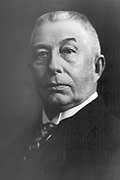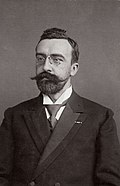
The Anti-Revolutionary Party was a Protestant conservative and Christian democratic political party in the Netherlands. The party was founded in 1879 by Abraham Kuyper, a neo-Calvinist theologian and minister. In 1980 the party merged with the Catholic People's Party (KVP) and the Christian Historical Union (CHU) to form the Christian Democratic Appeal (CDA).

General elections were held in the Netherlands on 5 July 1922. They were the first elections held under universal suffrage, which became reality after the acceptance of a proposal by Henri Marchant in 1919 that gave women full voting rights. Almost all major parties had a woman elected. The number of female representatives increased from one to seven. Only the Anti-Revolutionary Party principally excluded women from the House of Representatives. Another amendment to the electoral law increased the electoral threshold from 0.5% to 0.75%, after six parties had won seats with less than 0.75% of the vote in the previous elections.
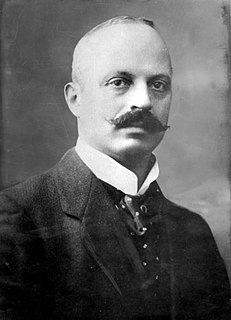
JonkheerCharles Joseph Marie Ruijs de Beerenbrouck was a Dutch politician of the defunct Roman Catholic State Party (RKSP), later formed to the Catholic People's Party (KVP) now merged into the Christian Democratic Appeal (CDA). He served as Prime Minister of the Netherlands from 9 September 1918 until 4 August 1925 and from 10 August 1929 until 26 May 1933.

The Roman Catholic State Party was a Catholic Christian democratic political party in the Netherlands. The party was founded in 1926 as a continuation of the General League of Roman Catholic Caucuses. During its entire existence, the party was in government. In 1945 the party became the Catholic People's Party (KVP).

The General League of Roman Catholic Riding Associations, informally called the General League, was a Catholic political party in the Netherlands. It is one of the ancestors of the Christian Democratic Appeal, currently a major party in the Netherlands.

The Minister of Foreign Affairs is the head of the Ministry of Foreign Affairs and a member of the Cabinet and the Council of Ministers. The incumbent minister is Wopke Hoekstra of the Christian Democratic Appeal (CDA) who has been in office since 10 January 2022. Regularly a State Secretary is assigned to the Ministry who is tasked with specific portfolios, currently the function is not in use. Additionally since 1965 there has been a Minister without Portfolio assigned to the Ministry, the Minister for Foreign Trade and Development Cooperation has traditionally Development Cooperation as portfolio, since 2012 the portfolio of Trade and Export has been assigned added to the function. The current Minister for Foreign Trade and Development Cooperation is Liesje Schreinemacher of the People's Party for Freedom and Democracy (VVD) who has been in office since 10 January 2022.

The deputy prime minister of the Netherlands is the official deputy of the head of government of the Netherlands. In the absence of the prime minister of the Netherlands the deputy prime minister takes over his functions, such as chairing the Cabinet of the Netherlands and the Council of Ministers of the Netherlands. Conventionally, all of the junior partners in the coalition get one deputy, and the deputies are ranked according to the size of their respective parties. The incumbent deputy prime ministers are Sigrid Kaag of the Democrats 66 serving as Minister of Finance, Wopke Hoekstra of the Christian Democratic Appeal serving as Minister of Foreign Affairs and Carola Schouten of the Christian Union serving as Minister for Welfare and Civic Engagement.
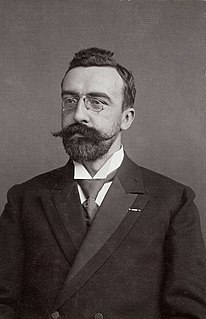
Petrus Josephus Mattheus "Piet" Aalberse Sr. was a Dutch politician of the defunct General League of Roman Catholic Caucuses (ABRK) later the Roman Catholic State Party (RKSP) and later co-founder of the Catholic People's Party (KVP) now merged into the Christian Democratic Appeal (CDA) party and jurist. He was granted the honorary title of Minister of State on 31 December 1934.

This article gives an overview of Christian democracy in the Netherlands, which is also called confessionalism, including political Catholicism and Protestantism. It is limited to Christian democratic parties with substantial support, mainly proved by having had a representation in parliament. The sign ⇒ means a reference to another party in that scheme.

Mgr. mr. dr. Wilhelmus Hubertus (Wiel) Nolens was a Dutch politician and a Roman Catholic priest.

The Third Ruijs de Beerenbrouck cabinet was the cabinet of the Netherlands from 10 August 1929 until 26 May 1933. The cabinet was formed by the political parties Roman Catholic State Party (RKSP), Anti-Revolutionary Party (ARP) and the Christian Historical Union (CHU) after the election of 1929. The centre-right cabinet was a majority government in the House of Representatives. It was the last of three cabinets of Charles Ruijs de Beerenbrouck, the Leader of the Roman Catholic State Party as Prime Minister.
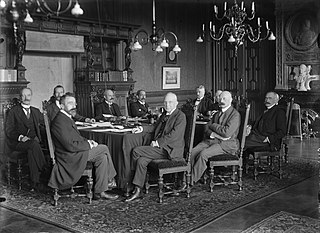
The First Ruijs de Beerenbrouck cabinet was the cabinet of the Netherlands from 9 September 1918 until 18 September 1922. The cabinet was formed by the political parties Roman Catholic State Party (RKSP), Anti-Revolutionary Party (ARP) and the Christian Historical Union (CHU) after the election of 1918. The centre-right cabinet was a majority government in the House of Representatives. It was the first of three cabinets of Charles Ruijs de Beerenbrouck, the Leader of the Roman Catholic State Party as Prime Minister.

Laurentius Nicolaas Deckers was a Dutch politician and diplomat of the defunct Roman Catholic State Party (RKSP) and later co-founder of the Catholic People's Party (KVP) now merged into the Christian Democratic Appeal (CDA) party and agronomist.




